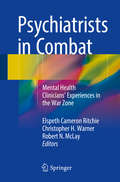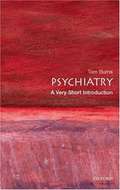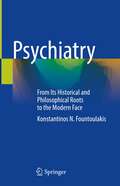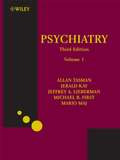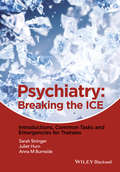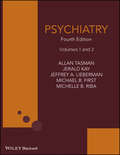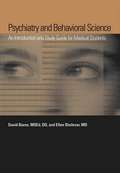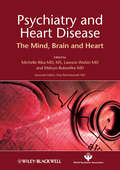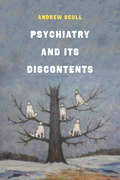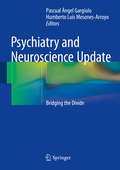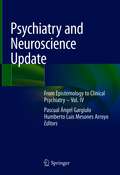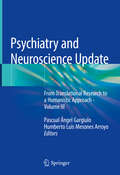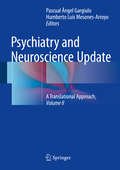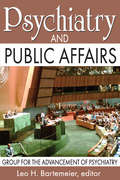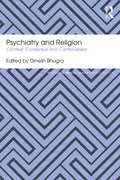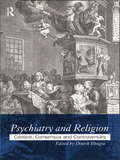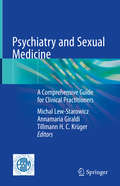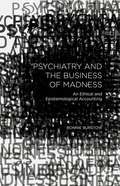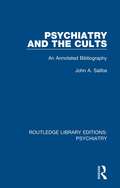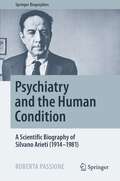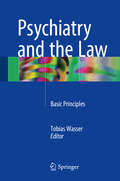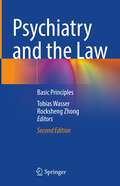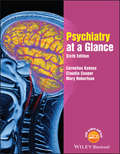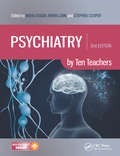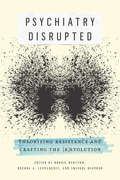- Table View
- List View
Psychiatrists in Combat
by Elspeth Cameron Ritchie Christopher H. Warner Robert N. MclayThis book tells the professional and personal experiences of American military psychiatrists and their colleagues in the longest conflict in American history. These highly trained men and women treat service members for the psychological consequences from their experiences in battle, including killing enemy combatants; seeing wounded and killed civilian casualties; losing their friends in combat; factoring in personal mental health needs, including psychiatric drug treatment; and potentially dealing with their own physical injuries from being shot or blown up. The volume consists of 20 short first-person case studies from the mental health providers who have been risking their lives while treating patients in the battlefield since 9/11. Written by expert psychiatrists who have experienced these challenges directly, this texts offers both a clinical and personal account that is not found anywhere else. Topics include tips on providing psychotherapy in battle, evaluating and treating detainees in war prisons such as Abu Ghraib and Guantanamo Bay, and the unique challenges of prescribing medication to patients who are also comrades in war. Psychiatrists in Combat is uniquely positioned to be a valuable resource for psychiatrists interested in trauma and veterans, psychologists, social workers, occupational therapists, military health personnel, and mental health professionals interested in military psychiatry.
Psychiatry: A Very Short Introduction
by Tom BurnsPsychiatry is increasingly a part of everyday life. The growing number of patients being diagnosed with depression, ADD, alcoholism, and other illnesses mean that few people are not touched by it. This book provides a valuable and comprehensible introduction to the subject. It starts with the history of its development as a scientific field, including the identification of major mental illnesses, the rise and fall of the asylum system, and the flourishing of psychoanalysis and other psychotherapies. More than any other branch of medicine, psychiatry has been attacked and criticized. There is a long list of perceived horrors--patient abuse, bizarre medical experiments, mind-control by evil governments, coercion by maniacal hypnotists. Modern psychiatry brings with it new controversies, such as the perceived over-prescription of antidepressants and behavior modifiers for children and teens, or unchecked marketing power of drug companies. This book does not draw conclusions on these issues, but rather provides the reader with a clear understanding of what psychiatry is, and what it does, so that they can draw their own. It is a great reference for anyone with an interest in mental illness and its treatment, students of psychiatry, medicine, psychology, and history of science, and health professionals.
Psychiatry: From Its Historical and Philosophical Roots to the Modern Face
by Konstantinos N. FountoulakisThis book was the end product of life experiences, thoughts and intellectual wanderings of the author, who through his career and for the last twenty years was always serving all the three aspects of a Psychiatrist: He is a clinician, a researcher and an academic teacher. The book includes a comprehensive history of Psychiatry since antiquity and until today, with an emphasis not only on main events but also specifically and with much detail and explanations, on the chain of events that led to a particular development. At the center of this work is the question ‘What is mental illness?’ and ‘Does free will exist?’. These are questions which tantalize Psychiatrists, neuroscientists, psychologists, philosophers, patients and their families and the sensitive and educated lay persons alike. Thus, the book includes a comprehensive review and systematic elaboration on the definition and the concept of mental illness, a detailed discussion on the issue of free will as well as the state of the art of contemporary Psychiatry and the socio-political currents it has provoked.Finally the book includes a description of the academic, social and professional status of Psychiatry and Psychiatrists and a view of future needs and possible developments. A last moment addition was the chapter on conspiracy theories, as a consequence of the experience with the social media and the public response to the COVID-19 outbreak which coincided with the final stage of the preparation of the book. Their study is an excellent opportunity to dig deep into the relation among human psychology, mental health, the society and politics and to swim in intellectually dangerous waters.
Psychiatry
by Mario Maj Jeffrey A. Lieberman Allan Tasman Jerald Kay Michael B. FirstExtensively revised and updated this edition reflects the progress and developments in the field. With 127 chapters and over 400 contributors this book is a truly comprehensive exposition of the specialty of psychiatry.Written by well-known and highly regarded experts from around the world, it takes a patient-centered approach making it an indispensable resource for all those involved in the care of patients with psychiatric disorders.For this new edition, the section on the Neuroscientific Foundations of Psychiatry has been completely revised, with a new author team recruited by Section Editors Jonathan Polan and Eric Kandel. The final section, Special Populations and Clinical Settings, features important new chapters on today's most urgent topics, including the homeless, restraint and geriatric psychiatry.Key features include:Coverage of the entire field of psychiatry, from psychoanalysis to pharmacology and brain imaging, including family relations, cultural influence and change, epidemiology, genetics and behavioral medicineClinical vignettes describing current clinical practice in an attractive designNumerous figures and tables that facilitate learning and comprehension appear throughout the textClear comparisons of the DSM-IV-TR and ICD-10 criteria for easy understanding in a global contextDiagnostic and treatment decision trees to help both the novice and experienced readerThe chapter on Cognitive Behavioral Therapies by Edward Friedman, Michael Thase and Jesse Wright is freely available. Please click on Read Excerpt 2 above to read this superb exposition of these important therapies.
Psychiatry
by Sarah L. Stringer Anna M. Burnside Juliet HurnPsychiatry: Breaking the ICE contains everything psychiatry trainees need in order feel confident and competent in general adult inpatient and community placements. A practical and reassuring guide to life as a psychiatrist, structured around the tasks expected both in day-to-day practice and in out-of-hours work Key themes running throughout the book include ethical and legal issues, risk assessment and management, patient experience and safe prescribing The authors are closely involved in the training, mentoring and supervision of core trainees, and know the real-world challenges faced by junior psychiatrists
Psychiatry, 2 Volume Set: Self-assessment And Review (National Medical Ser.)
by Michael B. First Jeffrey A. Lieberman Allan Tasman Michelle Riba Jerald KayNow in a new Fourth Edition, Psychiatry remains the leading reference on all aspects of the current practice and latest developments in psychiatry.From an international team of recognised expert editors and contributors, Psychiatry provides a truly comprehensive overview of the entire field of psychiatry in 132 chapters across two volumes. It includes two new sections, on psychosomatic medicine and collaborative care, and on emergency psychiatry, and compares Diagnostic and Statistical Manual (DSM-5) and International Classification of Diseases (ICD10) classifications for every psychiatric disorder.Psychiatry, Fourth Edition is an essential reference for psychiatrists in clinical practice and clinical research, residents in training, and for all those involved in the treatment psychiatric disorders.
Psychiatry and Behavioral Science: An Introduction and Study Guide for Medical Students
by Ellen H. Sholevar David BaronThis easy-to-read, unique format text combines introductory psychiatry content with board-style review questions written for first and second year medical students. The book is intended to be used as the required text for pre-clinical psychiatric education. The user-friendly split page format includes clinical vignettes, "fun facts," and relevant art work. Each chapter contains board review questions that prepare the medical student for USMLE Step 1 and COMLEX 1. By using a clinical approach consistent with the needs of today's medical students, the authors hope to prepare first and second year medical students for their exams and clinical rotations.
Psychiatry and Heart Disease
by Lawson Wulsin Divy Ravindranath Michelle Riba Melvyn RubenfireThis unique book will help psychiatrists to understand better the risks of cardiovascular illness and cardiologists to appreciate possible pathophysiological links with psychiatric conditions. It describes the common psychiatric conditions, their key features and how they may influence cardiovascular disease, outcomes, and quality of life. It also considers the cardiovascular complications that may arise as a result of mental illness. In an exciting, collaborative approach, psychiatrists and cardiologists combine their expertise throughout the book to provide guidance on the best way to manage such patients, considering the patient as a whole, not the individual conditions.
Psychiatry and Its Discontents
by Andrew ScullWritten by one of the world’s most distinguished historians of psychiatry, Psychiatry and Its Discontents provides a wide-ranging and critical perspective on the profession that dominates the treatment of mental illness. Andrew Scull traces the rise of the field, the midcentury hegemony of psychoanalytic methods, and the paradigm’s decline with the ascendance of biological and pharmaceutical approaches to mental illness. The book’s historical sweep is broad, ranging from the age of the asylum to the rise of psychopharmacology and the dubious triumphs of “community care.” The essays in Psychiatry and Its Discontents provide a vivid and compelling portrait of the recurring crises of legitimacy experienced by “mad-doctors,” as psychiatrists were once called, and illustrates the impact of psychiatry’s ideas and interventions on the lives of those afflicted with mental illness.
Psychiatry and Neuroscience Update
by Pascual Ángel Gargiulo Humberto Luis Mesones ArroyoThe intention of this unique title is to bridge the gap between psychiatry and neuroscience, allowing a fruitful dialogue between both sciences. Recognizing that psychiatry has received important contributions from the basic neurosciences and that the basic neurosciences have received inspiration and objectives from the open problems of psychiatry, Psychiatry and Neuroscience: Bridging the Divide is designed to identify the borders, trends and implications in both fields today. Comprehensive and developed by a renowned group of experts from both fields, the book is divided into four parts: Epistemological Considerations About the Study of Normal and Abnormal Human Behaviors; From Basic Neurosciences to Human Brain; Neurosciences, Learning, Teaching and the Role of Social Environment and Explaining Human Pathological Behaviors: From Brain Disorders to Psychopathology. A unique and invaluable addition to the literature in psychiatry and neuroscience, Psychiatry and Neuroscience: Bridging the Divide offers an important and clearer understanding of the relationship between psychiatry and neuroscience.
Psychiatry and Neuroscience Update: From Epistemology to Clinical Psychiatry – Vol. IV
by Pascual Ángel Gargiulo Humberto Luis Mesones ArroyoThis broad and thought-provoking volume provides an overview of recent intellectual and scientific advances that intersect psychiatry and neuroscience, offering a wide range of penetrating insights in both disciplines. The fourth volume on the topic in the last several years from a varying panel of international experts identifies the borders, trends and implications in both fields today and goes beyond that into related disciplines to seek out connections and influences. Similar to its three Update book predecessors, Psychiatry and Neuroscience – Volume IV presents a range of interesting topics in the main disciplines – psychiatry and neuroscience – and attempts to provide deeper comprehension or explication of the normal and diseased human mind, its biological correlates and its biographical and existential implications. This engaging volume continues the previous style of exploring different disciplines and trying to integrate disciplinary evidence from varying points of view in an organic manner. The first section is about epistemological considerations regarding the study of normal and abnormal human behaviors, including, for example, the topic of phenomenological psychopathology and phenomenological psychiatry in relation to schizophrenia and substance misuse, among other topics. Section 2 addresses issues around the translation of basic neuroscience to expression in the human brain and behavioral implications. Section 3 discusses the issues of learning, teaching and the role of social environment in the field of neuroscience. Finally section 4 reviews various perspectives on explaining human pathological behaviors -- from brain disorders to psychopathology.
Psychiatry and Neuroscience Update: From Translational Research to a Humanistic Approach - Volume III
by Humberto Luis Mesones Arroyo Pascual Ángel GargiuloThis broad and thought-provoking volume provides an overview of recent intellectual and scientific advances that bridge the gap between psychiatry and neuroscience, offering a wide range of penetrating insights in both disciplines. The third volume on the topic in the last several years from a varying panel of international experts, this title identifies the borders, trends and implications in both fields today and goes beyond that into related disciplines to seek out connections and influences. Similar to its two Update book predecessors, Psychiatry and Neuroscience – Volume III presents the current state-of-the-art in the main disciplines – psychiatry and neuroscience – and attempts to provide deeper comprehension or explication of the normal and diseased human mind, its biological correlates and its biographical and existential implications. This engaging volume continues the previous style of exploring different disciplines and trying to integrate disciplinary evidence from varying points of view in an organic manner. Developed for clinicians and researchers in the fields of medicine, psychiatry, psychology and biology, this third volume also will be of great interest to students and university professors of diverse disciplines.
Psychiatry and Neuroscience Update - Vol. II
by Pascual Ángel Gargiulo Humberto Luis Mesones-ArroyoThe aim of this unique book is to provide an overview of recent advances bridging the gap between psychiatry and neuroscience, allowing a fruitful dialogue between both sciences. The emerging interactions and mutual contributions between neuroscience and psychiatry are here recognized. This book is designed to identify the borders, trends and implications in both fields today. Comprehensive and developed by a renowned group of experts from both fields, the book is divided into four parts: Epistemological Considerations About the Study of Normal and Abnormal Human Behaviors; From Basic Neurosciences to Human Brain; Neurosciences, Learning, Teaching and the Role of Social Environment; and Explaining Human Pathological Behaviors: From Brain Disorders to Psychopathology. A unique and invaluable addition to the literature in psychiatry and neuroscience, Psychiatry and Neuroscience Update - Vol. II: A Translational Approach offers an important and clearer understanding of the relationship between these two disciplines. This book is directed to students, professionals and researchers of medicine, psychology, psychopedagogy and nursery.
Psychiatry and Public Affairs: Group for the Advancement of Psychiatry
by Leo H. BartemeierThis stimulating collection bears witness to the insight that psychiatrists, with their special training and background and concern for human relationships, can contribute solutions to major problems of public affairs and public policy. The contributors represent the summation and distillation of the best thinking of psychiatry's leaders. They represent a variety of experiences and viewpoints, making possible a many-faceted approach to problems of national and international concern.Based on completely documented reports of individual members and symposium discussions, Psychiatry and Public Affairs examines four major areas of public interest: the social responsibility of psychiatry, emphasizing the psychiatric aspects of school desegregation; psychiatry's role in international relations and understanding cross-cultural communication and working abroad; studies of forceful indoctrination or "brainwashing" and the social and psychiatric implications of the threat of nuclear war.Contributors and contributions included here are "Physical and Social Isolation," Jack Vernon; "Psychiatric Aspects of Chinese Thought Reform," Robert J. Lifton; "Patterns of Reactions to Severe Chronic Stress in American Army POWs to the Chinese," Edgar H. Schein; "The Coming Struggle for More Responsibility," Pare Lorentz; "Some Implications of the Fall-Out Problem," Maurice B. Visscher; "Psychological Aspects of the Nuclear Arms Race," Franklin C. McLean; "Solitary Confinement," Milton Meltzer; and "Sleep Deprivation," David Tyler. Psychiatry and Public Affairs explores ideas and problems on the advancing edge of psychiatry.The Group for the Advancement of Psychiatry (GAP) envisages a continuing program of work according to the following aims: to collect and appraise significant data in the field of psychiatry, mental health, and human relations; to re-evaluate old concepts and to develop and test new ones; and to apply the knowledge thus obtained fo
Psychiatry and Religion: Context, Consensus and Controversies (Routledge Mental Health Classic Editions)
by Dinesh BhugraPsychiatry and Religion: Context, Consensus and Controversies works to eradicate the distinction between spiritual and psychological welfare and promote greater understanding of the relationship between the two. This book brings together chapters from fifteen mental health practitioners and pastoral workers to explore what their different philosophies have to offer the individuals in their care. As well as all the major world religions, the text also provides detailed information about newer religions and the significance of their belief systems for mental health management. The book examines the positive and negative effects that strict moral codes and religious rituals can produce and shows how awareness of these effects is crucial to the treatment of these patients. This classic edition of Psychiatry and Religion, with a new introduction from Dinesh Bhugra, will continue to provide an important resource to practicing and training psychiatrists.
Psychiatry and Religion: Context, Consensus and Controversies (Routledge Mental Health Classic Editions Ser.)
by Dinesh BhugraThe argument of this book is that the divide between psychiatry and religion is an artificial one and that there is much room for understanding the same phenomena from different perspectives. In it thirteen senior mental health professionals and pastoral workers come together to explore what their different philosophies have to offer each other for the benefit of the individuals in their care. The book as a whole: * sets the relationship between psychiatry and religion in historical context * provides detailed information about specific religions and the significance of their belief systems for mental health management * examines the relationship between psychopathology, psychiatry and religion.
Psychiatry and Sexual Medicine: A Comprehensive Guide for Clinical Practitioners
by Michal Lew-Starowicz Annamaria Giraldi Tillmann H. C. KrügerPsychiatry meets sexual medicine! This book explores the links between mental and sexual health and provides guidance for the treatment of the most common sexual problems. The book fills the need of many clinicians and trainees who work in the field of psychiatry and sexual medicine. Offering comprehensive and clearly structured information, case presentations, and key messages this book focuses on sharing essential knowledge and skills of recognized experts in the field. Get inspired by the vivid interactions of psychiatry and sexual medicine and help your patients on their way to improved sexual health!
Psychiatry and the Business of Madness
by Bonnie BurstowPsychiatry and the Business of Madness deconstructs psychiatric discourse and practice, exposes the self-interest at the core of the psychiatric/psychopharmacological enterprise, and demonstrates that psychiatry is epistemologically and ethically irredeemable. Burstow's medical and historical research and in-depth interviews demonstrate that the paradigm is untenable, that psychiatry is pseudo-medicine, that the "treatments" do not "correct" disorders but cause them. Burstow fundamentally challenges our right to incarcerate or otherwise subdue those we find distressing. She invites the reader to rethink how society addresses these problems, and gives concrete suggestions for societal transformation, with "services" grounded in the community. A compelling piece of scholarship, impeccable in its logic, unwavering in its moral commitment, and revolutionary in its implications.
Psychiatry and the Cults: An Annotated Bibliography (Routledge Library Editions: Psychiatry #20)
by John A. SalibaOriginally published in 1987, this title was compiled in response to the concern, in some segments of society, about the presence of new religious movements in the West in the second half of the twentieth century. There are lots of psychological questions surrounding cults and the influence they have over their members. These questions have been operative in the accumulation of this annotated bibliography, which was intended primarily as a reference guide for psychiatrists and counsellors who advise cult members, ex-cult members and their bewildered parents, and lawyers who use psychiatric arguments in the courts.
Psychiatry and the Human Condition: A Scientific Biography of Silvano Arieti (1914–1981) (Springer Biographies)
by Roberta PassioneThis book is the result of extensive archival research conducted on the Collection “Silvano Arieti Papers” held in the Manuscript Division of the Library of Congress, Washington, D.C. It offers readers the first scientific biography of the renowned Italian-born psychiatrist Silvano Arieti, who in 1939 emigrated to the United States, where he gained fame and recognition for his work on schizophrenia. In 1975, the second edition of his book, Interpretation of Schizophrenia, received the National Book Award in Science. The book has been cast as a twofold journey: an exploration of the life of a psychiatrist and scientist and an overview of twentieth century psychiatry and its significant issues, debates, and transformations. Readers will find useful insights for a better understanding of psychiatry as a discipline capable of portraying the complexity of human nature.
Psychiatry and the Law
by Tobias WasserThis book is specifically designed for new psychiatrists and all other medical professionals who lack the training necessary to confront the complicated legal and ethical issues that arise at the intersection of the mental health and judicial systems. Written by experts in the field, each chapter begins with a challenging case vignette synthesized from a historical legal case that places the reader in the role of the treatment provider. The text presents details of the legal case, historical significance, and the precedent it set before discussing the core principles of that particular subject area. Each chapter reviews the existing literature and reinforces the most salient points. Topics include risk assessment, substance misuse and the law, legal issues within child and adolescent psychiatry, involuntary medication considerations, and other challenges that are often not sufficiently addressed in training. The text is specifically designed for new psychiatrists and other professionals who are transitioning from their studies into clinical practice, concisely explaining and defining the issues in a practical, reader-friendly tone suitable as both a quick-reference in a busy environment or as a resource for private study. Psychiatry and the Law: Basic Principles is an excellent resource for new psychiatrists, psychologists, social workers, students, and other professionals accommodating medical and legal boundaries in clinical practice.
Psychiatry and the Law: Basic Principles
by Tobias Wasser Rocksheng ZhongThis book is designed to help new psychiatrists and other medical professionals confront the complicated legal and ethical issues that arise at the intersection of the mental health and judicial systems. The law provides the boundaries in which clinical care operates. Appreciating these boundaries is particularly important when working with individuals whose rights may already be curtailed (forensic settings, for example). Understanding how psychiatry and the law interface provides students and trainees with a foundation for building their skills and attitudes through training and beyond. This text can guide or supplement education on the legal regulation of psychiatry, the use of psychiatry to answer legal questions, and the treatment of individuals with criminal justice involvement.In the second edition of this text, the editors have updated several chapters with new information and added chapters covering topics not addressed in the first edition. Each chapter begins witha clinical case vignette that brings the topic to life through a clinical encounter, the majority of which are based on landmark legal cases that set a historical precedent. The text presents details of the legal case, historical significance, and the precedent it set before discussing the core principles of the subject area. Each chapter reviews the existing literature and reinforces the most salient points. Topics include risk assessment, substance misuse and the law, legal issues within child and adolescent psychiatry, involuntary medication considerations, and other challenges that are often not sufficiently addressed in training.Psychiatry and the Law: Basic Principles covers a wide range of topics that would be suitable for use as the basis of a course in forensic psychiatry for psychiatry residents and is an excellent resource for new psychiatrists, psychologists, social workers, students, and other professionals navigating medical and legal boundaries in clinicalpractice.
Psychiatry at a Glance
by Claudia Cooper Cornelius Katona Mary RobertsonPsychiatry at a Glance is an easy-to-use, accessible introductory and study text for all students of psychiatry. It helps develop your skills in history taking and performing the Mental State Examination (MSE), and presents 'need to know' information on the basic science, treatment, and management of the major disorders.This edition features:Thoroughly updated and reorganised artwork, offering greater clarity and easier understanding for those new to the subjectGreater emphasis on history taking and examination - essential for clinical work and clerking patientsNew chapters on mental health capacity and coverage of the Australian and New Zealand health care legislationEven more Extended Matching Questions, brand new Single Best Answer Questions, and sample OSCE stations so you can test your knowledgeA brand new companion website at www.ataglanceseries.com/psychiatry, featuring updated case studies and downloadable illustrations.Psychiatry at a Glance is the ideal companion for anyone about to start a psychiatric attachment or module and will appeal to medical students, junior doctors and Psychiatry trainees as well as nursing students and other health professionals.
Psychiatry by Ten Teachers (Second Edition)
by Stephen Cooper Nisha Dogra Brian LunnPsychiatry by Ten Teachers follows the highly-praised and successful ‘Ten Teachers’ tradition of providing the key information in a chosen specialty as required by the medical undergraduate, junior doctor and trainee GP, written by ten respected experts in the field. With medical students closely involved in the text’s development from the outset the text focuses on what the medical student and junior really need to know, with a clear rationale for the inclusion of every topic discussed at a level appropriate for the inexperienced, and will be of value to their future career whatever field they ultimately decide to specialize in. Completely up to date, this revised second edition encourages students and recently qualified doctors to get the most out of their psychiatry and community attachments, without overwhelming them with unnecessary detail. In line with the core curriculum recommended by the Royal College of Psychiatry, useful tips and advice ensure this is much more than a standard introduction to the subject, encouraging additional reading, supporting critical thinking and bringing exam success.
Psychiatry Disrupted: Theorizing Resistance and Crafting the (R)evolution
by Bonnie Burstow Brenda A. LeFrançois Shaindl DiamondThere is growing international resistance to the oppressiveness of psychiatry. While previous studies have critiqued psychiatry, Psychiatry Disrupted goes beyond theorizing what is wrong with it to theorizing how we might stop it. Introducing readers to the arguments and rationale for opposing psychiatry, the book combines perspectives from anti-psychiatry and critical psychiatry activism, mad activism, antiracist, critical, and radical disability studies, as well as feminist, Marxist, and anarchist thought. The editors and contributors are activists and academics - adult education and social work professors, psychologists, prominent leaders in the psychiatric survivor movement, and artists - from across Canada, England, and the United States. From chapters discussing feminist opposition to the medicalization of human experience, to the links between psychiatry and neo-liberalism, to internal tensions within the various movements and different identities from which people organize, the collection theorizes psychiatry while contributing to a range of scholarship and presenting a comprehensive overview of resistance to psychiatry in the academy and in the community. Contributors include Simon Adam (University of Toronto), Rosemary Barnes University of Toronto, Peter Beresford (Brunel University), Bonnie Burstow (University of Toronto), Chris Chapman (York University), Mark Cresswell (Durham University), Shaindl Diamond (York University), Chava Finkler (Memorial University), Ambrose Kirby (therapist in private practice, Brenda A. LeFrançois (Memorial University of Newfoundland), Mick McKeown (University of Central Lancashire), Robert Menzies (Simon Fraser University), China Mills (Oxford University), Tina Minkowitz (World Network of Users and Survivors of Psychiatry), Ian Parker (University of Leicester), Susan Schellenberg, Helen Spandler (University of Central Lancashire), and AJ Withers (York University). A courageous anthology, Psychiatry Disrupted is a timely work that asks compelling activist questions that no other book in the field touches.
